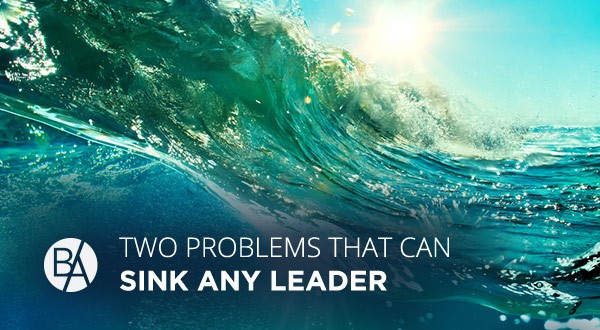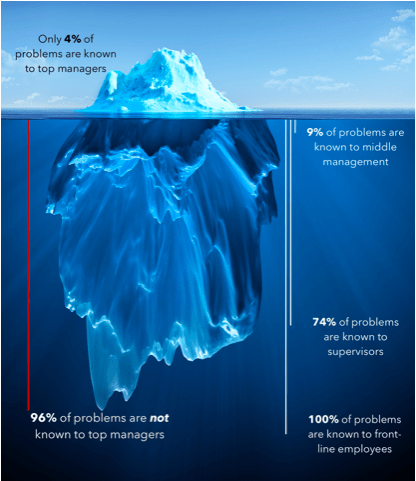Two Problems That Can Sink Any Leader
I remember my days as a young leader. Some days, it seemed like I was on top of the world. Other days, I wanted to beat my head against the wall in my office! More often than not, my problems stemmed from people. But what I learned one day in 1989 would rock my leadership world and save my head from being used as a hammer!
You see, prior to 1989 I was steering the “ship” of my business, but I had run aground on an “iceberg”. And that iceberg was the cause of many of my frustrations and limited my effectiveness as a leader. This iceberg that threatened my leadership, and my business, was the Iceberg of Ignorance.
What is the Iceberg of Ignorance?
This principle is powerfully illustrated by the acclaimed study by consultant Sidney Yoshida. As shown below, the study concluded: “Only 4% of an organization’s front line problems are known by top management, 9% are known by middle management, 74% are known by supervisors, and 100% are known by front line employees.”
In October of 1989, I attended a three-day workshop called TRAC 5000 led by Jim Lundy. During that workshop I learned that I was standing on the Iceberg of Ignorance, unaware of most of the problems lurking beneath the surface in my organization.
Based on the statistics revealed in Yashido’s work, it’s likely that you too, have “cold feet” standing on top of your own similar iceberg. Take heart, fellow leader, what I’m about to share with you is the first step toward developing a leadership approach that effectively melts the Iceberg of Ignorance.
Every leader can be most effective by avoiding two common problems.
The First Problem
The first problem is that most leaders “don’t know what they don’t know.”
And they think they know all of the problems, challenges, and opportunities of their organization.
This thinking is the strongest among founders or leaders who have been in the organization for many years and are bright and knowledgeable.
Also, they tend to think that their problems and frustrations (a symptom) stem from their employees.
That is, until these leaders finally look into the mirror and recognize, that they are the problem (the root cause).
– John Maxwell
I have found that most leaders don’t ask their employees to offer input for ideas to address the problems, challenges, and opportunities they are experiencing on the front line.
However, part of these leaders’ current frustrations comes from unawareness of the real underlying problems in their organization.
Regardless of whether their business is just treading water or enjoying smooth sailing, little do they know that they just may be steering their “ship” right toward an iceberg.
Like that fateful night with the Titanic, their lack of knowledge could wind up sinking their business.
The Second Problem
The second problem that I have found is that some leaders think that they do include their people as they make decisions but, in reality, don’t truly involve their people in a meaningful way.
These leaders ask (on a limited basis) their employees to offer input for ideas to the problems, challenges, and opportunities they are experiencing on the front line.
They might engage their people in conversation when they cross paths in the office and other work areas.
They might even call folks, one at a time, into their office to solicit opinions and advice.
These leaders are, in fact, learning about some of the underlying problems in their organization as they go about talking to various individuals in the workplace.
But they are missing the significant improvements that result from group discussion and brainstorming around the challenges and opportunities that exist and lie ahead.
Why are these findings important?
Because if the problems, challenges, and opportunities remain unknown to the leadership, this ignorance will impede the execution or diminish the results of even the best-laid plans.
The bad news is that most leaders don’t notice these fundamental problems with their current leadership approach; they think that their own skills and expertise are good enough to navigate the waters of business.
The good news is that there is a lifeline of valuable information and insights right under the nose of most leaders—in their front-line employees. Changing the way you lead takes some intentional decisions on your part. Be assured that I will be here, to show you what worked for me and explain how it can work for you!
Is your leadership jeopardized by the Iceberg of Ignorance? What about the second problem? You can share your comments <here>. Please share this blog post with a co-worker and a friend.
Sent from my iPhone


No comments:
Post a Comment